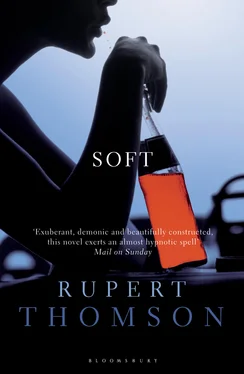‘It might be good to advertise in a very basic, almost old-fashioned way. I’m talking about posters, really. Half teaser, half mnemonic. All they would say is Kwench!. The word itself. Or maybe not even that. Maybe just the colours. It would intrigue the people who haven’t heard of Kwench! yet. It might also prompt our new sales force, our ambassadors —’
‘Ambassadors?’ Connor said.
It was Jimmy’s turn to explain. ‘That’s what I’m calling the people who’ll be going through our programme. Because that’s the role they’ll be playing. If you look up ‘ambassador’ in the dictionary you’ll see that there’s an archaic definition. An ambassador is quote ‘an appointed or official messenger’ unquote.’ He paused. ‘In more recent definitions, the word ‘mission’ is often mentioned …’
Connor nodded. ‘There is also, is there not, the sense of someone acting on someone else’s behalf —’
‘Exactly.’
‘Ambassadors.’ A smile appeared on Connor’s face, a smile that seemed to rise from underneath, slowly but steadily, like spilled liquid being soaked up by a paper towel.
From where he was sitting, on the other side of Connor’s desk, Jimmy watched the smile spread. He had the curious feeling he had just witnessed some kind of product demonstration, though he didn’t think he could have said exactly what the product was.
The first meeting with the external supplier took place on neutral ground at the end of the month. The location had been kept secret, even from Connor’s PA — according to Connor’s diary, he was visiting distributors in Middlesex — and, as they crossed the city that morning, Connor had once again stressed the highly confidential nature of the undertaking. ‘What is required here,’ he said, ‘as I’m sure you understand, is tact.’
Jimmy glanced out of the window. Dawn had brought very little light with it. A dark, bitter day. Leaves rattling against the taxi’s hubcaps as it swayed into Park Lane. The hotel Connor had chosen for the meeting lay just to the north of Marble Arch. With its stark, pale-grey façade, it looked suitably anonymous. Jimmy waited on the pavement while Connor paid, then followed him up the steps and into the lobby. He could have predicted the decor. Potted plants, brass fittings. Upholstery the colour of Thousand Island Dressing. He could have predicted the hotel guests as well — air hostesses with matching luggage, businessmen from out of town. But there were things he could not predict, the day itself, what it might hold, and this uncertainty fed into his muscles until they thrilled and sizzled like the wires on an electric fence.
‘And the name, sir?’ The girl behind reception had a wide, improbable smile, and wore her dark-blonde hair in a frisky pony-tail.
‘Connor.’
Once Connor had registered, the girl handed him a Ving card, which he immediately passed to Jimmy. Jimmy studied the piece of rectangular grey plastic. Ving cards always reminded him of props from Star Trek: though they had only just been invented, they seemed oddly primitive, antiquated — out of date.
Upstairs, on the fifth floor, he slid the card downwards into the lock. The light altered from red to green. He opened the door and walked in. It was a hotel room like any other — a double bed, a TV, air that smelled of dry-cleaning.
‘What time’s Lambert due?’ Jimmy asked.
‘Eleven,’ Connor said.
They were early.
Connor drank a bottle of sparkling water from the mini-bar. Jimmy took a seat at the round table, a blank notepad in front of him. He didn’t really know what to expect. Connor had told him that Lambert was being flown in at the company’s expense. From Europe, he had said. Would Lambert take his proposal literally? No doubt that was one of the aims of the meeting — to discuss tactics, to identify a strategy. Jimmy glanced at Connor who was standing at the window, hands clasped behind his back. Outside, it had begun to drizzle.
At five to eleven the phone rang. Connor picked it up and listened for a moment, then he said, ‘Yes, 506.’ He put the phone down and turned to Jimmy. ‘Lambert’s here,’ he said. Rather unnecessarily, Jimmy thought. Perhaps Connor was nervous after all.
The man who walked into the room had thick but neatly parted light-brown hair and wore a biscuit-coloured overcoat. Though the rain was now beating against the window, neither his hair nor his overcoat were wet, which only added to the mystique surrounding him, lending credence to the idea that he might be capable of extraordinary things.
‘Lambert,’ Connor said. ‘James Lyle.’
The palm of Lambert’s hand felt dry, slightly gritty, as though it had been dusted with chalk. Jimmy watched as Lambert removed his coat, folded it lengthways and laid it across the bed. Lambert’s hands were gentle and nurturing, almost chivalrous, so much so that Jimmy found himself imagining that the coat was not a coat at all, but a woman who had been turned into a coat — as a punishment, perhaps, or even by mistake. The idea seemed both absurd and possible, and Jimmy suddenly felt giddy, a little faint, as if he’d smoked too much grass. He poured himself a glass of water and drank half of it. Rain was tumbling past the window now. The bare branches of the trees shone like polished stone, and the sky was so dark that they had switched the lights on in the offices across the street.
Lambert sat down at the table, his briefcase on the floor beside his chair. If Jimmy had been asked to describe him, he would have found it difficult. He would have been tempted to generalise. Clean-cut, he would have said. Classic features. Clichés, in other words. He thought Lambert looked more like a doctor than anything else, an impression that was reinforced when Lambert began to speak. He had a voice that was quiet and firm, a voice tailor-made for diagnosis. I’m sorry, but you have cancer . Jimmy could hear him saying it. If Lambert had a sense of humour, he kept it hidden under layers of discretion and professionalism.
After talking for almost half an hour about unconscious information processing, what he called ‘perception without awareness’, Lambert suddenly tightened the focus.
‘Basically,’ he said, ‘you’re looking at a three-month programme. April to June.’
Connor’s head lifted slowly, as if it weighed much more than other people’s. ‘That’s the earliest start-date you can give us?’
‘I’m afraid so.’
Connor jotted something on his notepad.
‘The drug-trial scenario won’t work,’ Lambert said. ‘I’m recommending another route. I’m recommending a sleep laboratory.’ He waited, expecting another challenge, perhaps, but neither Connor nor Jimmy spoke. ‘It’s less high-profile,’ he explained, ‘less contentious. It’s got the same things going for it, though. You define the parameters — obstructive sleep apnoea, polysomnography, whatever — then you advertise for subjects to fit that profile. You pay them a fixed sum. After that, they’re yours.’
‘And you can set that up?’ Connor said.
‘Yes, I can.’
‘How would you go about it?’
Lambert was staring at the surface of the table. ‘Let’s just say I’m affiliated to a university.’
‘But there are dangers if it gets too medical, aren’t there?’ said Jimmy, speaking for the first time. ‘I mean, if doctors are involved?’
Lambert didn’t raise his eyes from the table. ‘My feeling is, you stay abstract. You focus on research, sleep studies. That way you get to choose exactly who your subjects are. Your target market.’ He grinned mirthlessly. The speed of it reminded Jimmy of lizards catching insects with their tongues.
‘And the technology?’ Connor asked.
Читать дальше












